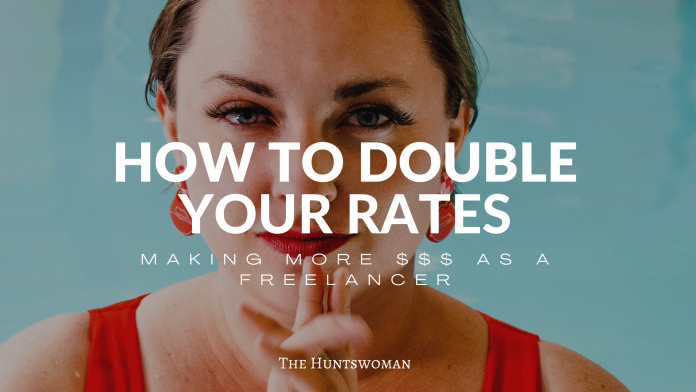Hey there! This post contains affiliate links. Using my links means I earn a commission, which helps me create more rad content. More on affiliates here.
One of my favorite things to share on social media is reminding and nudging people to raise their freelance rates or pricing.
And, while I love a good business tweet or Facebook rant about business – it occurred to me that this advice isn’t SUPER helpful without a clear discussion and guide on how to ACTUALLY raise your rates.
I love inspiring posts, but if folks can’t DO anything with them, then they’re, well, worthless.
Note: This post was first published on January 11, 2021. It was last updated on April 27, 2022!
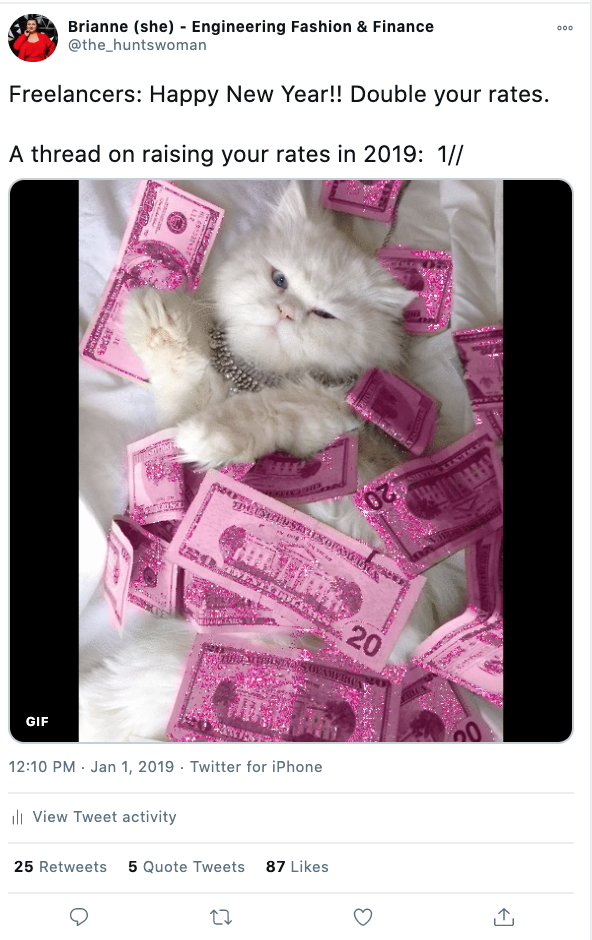
Let’s Talk Freelance Rates & Pricing!
Okay, setting a freelance rate can be pretty intimidating, and RAISING your rates as a freelancer can be even more so. I’ve been there!
This is going to be a long post (I’m diving in DEEP), and my goal is to answer the following questions:
- What minimum freelance rate should I set?
- What can I do to easily increase my hourly feelance rate?
- How do I increase my rates as a freelancer? What are the actual steps?
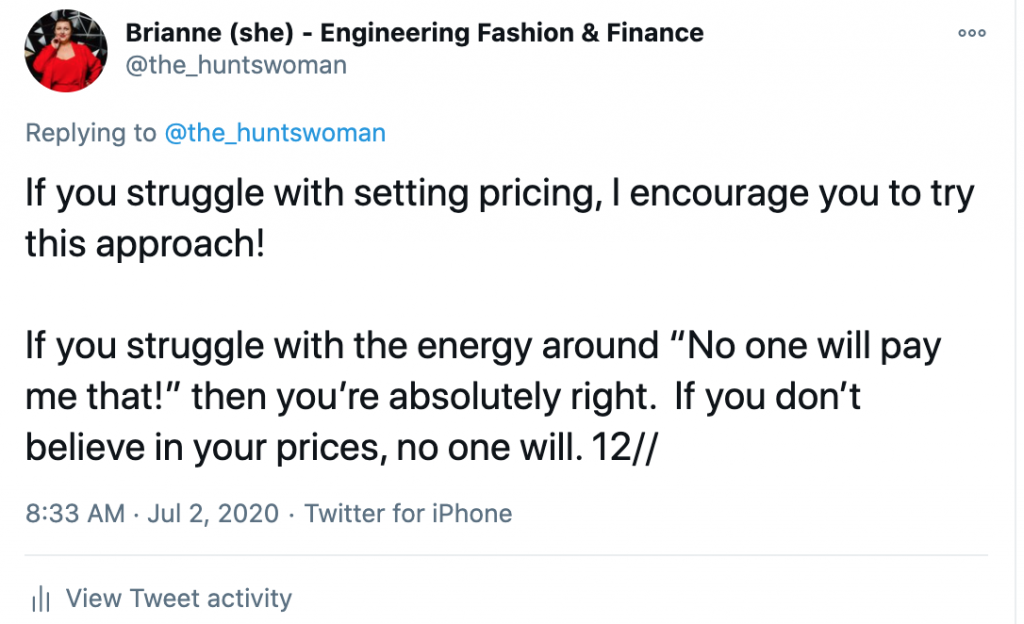
My Qualifications (Real Quick!)
I want you to know that I have experience doing this, so real quick: My name is Brianne, and I started freelancing in 2010. I’ve been freelancing for 10 years in a variety of spaces, from social media marketing to UI/UX design to career coaching. I’ve made over $20,000 on websites like UpWork, and I get the struggle around rates.

Raise Your Freelance Rates: What Freelance Rates Should I Set?
An issue I see with freelancers is that we don’t give ourselves pay raises! Folks will charge the same rates today as they did 5+ years ago!!!
Honey, no!! This is not helpful!
At minimum, I recommend building in a yearly raise into all of your contracts, by a certain percentage. This can be 10% – 20%.
Raise You Rate with Every Freelance Client
Additionally, regularly raising your rate with each freelance client is CRITICAL. When it comes to being a full-time freelancer, you need to get to $100 per hour as quickly as possible. I know that this will seem shocking to some of the virtual assistants and folks out there, but here’s why:
Until you hit $100ph, you are actively losing money. From paying for health insurance and business insurance to being able to contribute to your retirement account, charging less than $100 per hour means you are taking on a lot of risk and burden.
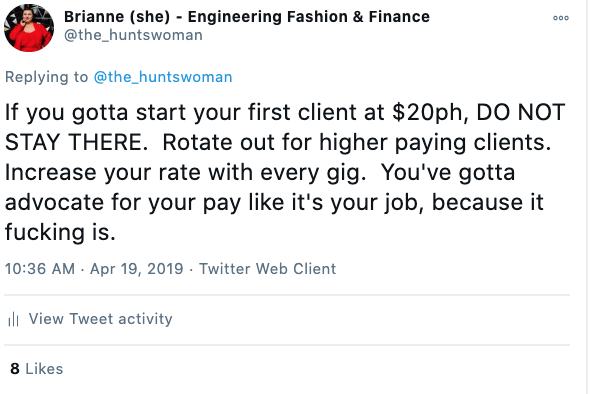
Freelance Rates Should Be No Less Than $50ph
If you are full-time freelancer in the USA, you should not be charging less than $50 per hour, unless you’re living in Southeast Asia and don’t have to deal with the US cost of living.
This often means acquiring a new skill or going after a specific client. Some industries are better paying than others, and it’s your job as a business owner (and yes, freelancers do own a business!) to be strategic with your offering and ideal client.
Additionally, I recommend that you do NOT charge by the hour for your clients. As you get better at your work, it takes less time. And then you bill for less hours?!!? Charging hourly incentivizes you to take more time, which isn’t helpful.
Because of this, I recommend estimating the # of hours you think a project will take (or how many hours the client needs) and multiplying it by 1.5 (projects always take more time than you think). THEN multiple by your hourly rate.
- Project Fee = (# of hours estimated) * 1.5 * Hourly Rate
This is also helpful, because a lot of clients will be SHOCKED at what you charge as a freelancer. They’re used to thinking in “9-5 money,” and they don’t realize your fee has to include things that a company employer would normally take care of.
TLDR: A project price incentivizes you to be as efficient as possible, and you make more per hour the better you are at your job!
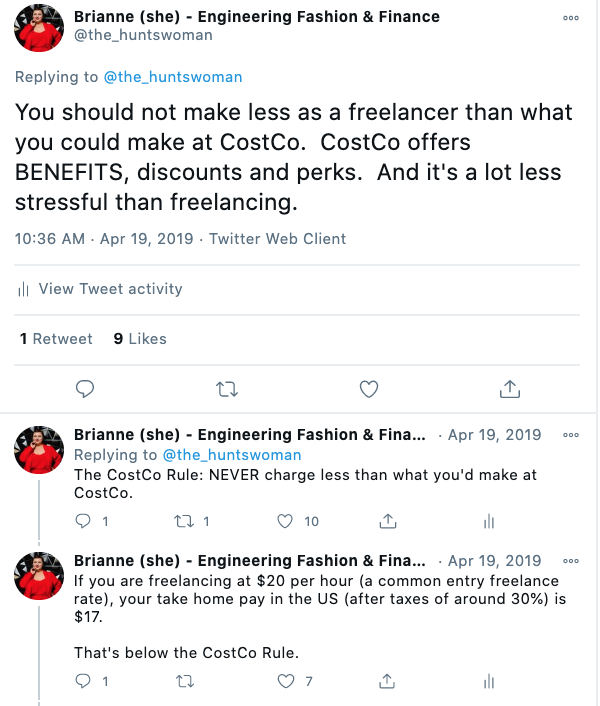
Stop Calling Yourself a “Freelancer”
I use the term “freelancer” in this blog post a lot, because it’s good SEO. I know people are googling things like “how to raise your rates as a freelancer” or “how to make more money as a freelancer.”
But, here’s the thing. I stopped calling myself a “freelancer” a couple of years into the game.
Why?
Because the word “freelancer” literally has the word “free” in it, and I’m not free! Through 10+ years of being self-employed and coaching clients who are self-employed, I’ve learned that you can easily level up by simply NOT USING THE DANG WORD! A lot of companies and clients seem to think freelancers should charge pennies, so we have to use a different word.
Replace the word “freelancer” with:
- Specialist (ie “Social media specialist” not “social media freelancer”)
- Consultant
- Contractor
- Whiz or Maven
- Self-Employed
- Solopreneur

How to Raise Freelance Rates – 3 Strategies & Tips
Okay, so now that we’ve had some real talk on what a minimum rate is and why project pricing is CRITICAL, let’s discuss a few of my favorite ways to raise rates:
Strategy #1: Build Freelance Rate Increases Into Contracts
I referenced this way to raise your freelance rates above, and now I’m going to dive in a bit more!
One of the easiest ways to raise your rates is to inform clients in your contract that you will do so! If you’re signing a longterm contract with a client as a freelancer, be sure to have a section somewhere in there about “Updated Rates and Pricing.”
In that section, note that you renegotiate with clients every year, quarter or 2x a year. Note in the section that new rates will be based on past performance and the market.
Some folks even build in an automatic rate increase, saying something like, “After 1 year of working together (on January 22, 2022), rates will automatically increase by 7%.” That way, you’re at least keeping up with an inflation rate, and getting paid more for more experience.
Alternatively, look at how much $$$ you made the client and negotiate based on that. Figure out how to tie your work to saving or making he client money, and then ask for a percentage!
[Need help figuring out how much to increase your rates by? Book me for a 1:1 session HERE, and I’ll help you put together a proposal you can use for future clients.]
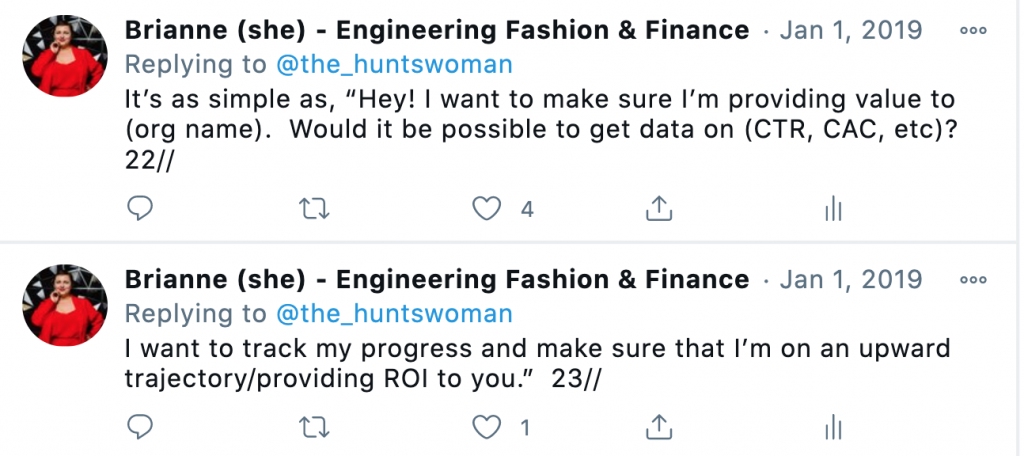
Strategy #2: Raise Freelance Hourly Rate by 10-20% with Every New Client
This is a CRITICAL strategy, especially if you’re not at the $100ph mark. With every new client you pitch, raise your rates 10-20% in the pitch. If you’ve landed a client at $35ph, then future proposals should have a rate of $38 – $45ph.
Here’s another way to think about it:
- Client #1: $25 per hour
- Client #2: $28 per hour
- Client #3: $32 per hour
- Client #4: $35 per hour
- Client #5: $45 per hour (start making larger jumps here)
By doing this, you’re automating giving yourself a raise! And you avoid the nasty mistake of failing to increase your rate for years. (Seriously, I can’t underscore enough how many freelancers fail to raise their rates.)
Additional Tip: Look for Rejection
Additionally, it is important that potential clients TURN YOU DOWN and tell you, “You’re too expensive.”
If everyone can afford you, you’re wayyyyy too cheap!
4 Rejections in a Row == Plateau Your Rate
Keep on raising your rate until you get a few rejections in a row, and then you can “plateau” at that rate for a bit.. But don’t stay at that rate for long! Figure out what skills you have that you can charge more for, and then focus on marketing those skills (or gaining new skills that snag a higher hourly rate.)
Hot Tip: Tie your work to performance metrics (also called “KPIs” or “Key Performance Indicators). Being able to tie your work to measurable improvements makes it easier to show your value – and get paid more.
[Trying to figure out what monthly rates to charge? Book me for a 1:1 coaching session, and I’ll help you create a servicing offering and pricing!)

Strategy #3: Fire or Hand Off Lowest Paying Freelance Clients
There’s a quote that goes something like, “It’s impossible to be a prophet in your own country.” Put another way, this means that when people feel like they know you, they’re less likely to buy-in to the new and improved you.
How does this relate to your freelance rates? Let me explain!
If you sign a client at $25 per hour, there’s almost ZERO chance that that client will keep increasing your rates to $100 per hour. It doesn’t matter how much of a rockstar you are, businesses can be pretty firm in the dollar amount they assign to someone. They often can’t see how you’ve leveled up in skill since starting.
If you raise your rate by more than 30%, old clients will drop off. That’s ok! Be sure to be strategic in onboarding and offboarding clients!
Eventually, it will come time to fire them. Or “let them go,” whichever phrase makes you more jazzed.
I recommend replacing lower paying clients after you have secured and onboarded a higher paying client, and you’re pretty sure the new client will work out. Don’t hand off the old client too soon! You will have a few weeks where you work longer hours, as you vet the new client!
When it comes time to hand-off the lower paying client, end the contract per the agreement in your contract (are you seeing how important a thorough contract is?). I recommend giving the client 30 days notice, and you can share the contact info of a few freelancers they can meet with.
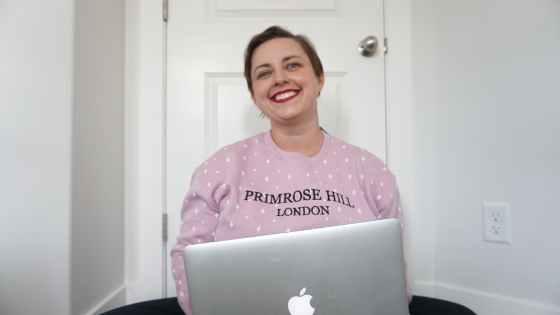
WARNING: Don’t Work More than 10-12 Hours Per Freelance Client
A big mistake freelancers make is getting 50% or ALL of their money from one client.
Honey, that’s not freelancing. You’re basically an employee (in my opinion), without any of the protections an employee gets. If that client fires you or lets you go, you’ll be in hot water!
Aditionally, all of these strategies require that you be in a strong negotiating position. If you are working 30-40 hours per week for one client, it’s difficult to walk away. You can’t negotiate well, because they’re your main stream of income!
A good negotiation requires that you be able to walk away!!
For this reason, I only allocate 10-12 hours of my time to a client. If they want more than that, then they should hire an employee. Sometimes for a project, a client will need more hours, and that’s when I get a 50% (or more) deposit, along with a hefty early termination fee.
Diversify your risk! Don’t put all of your eggs in one basket.

WARNING: Vet Potential Freelance Clients
The difference between a freelancer who is dancing in money and a stressed out freelancer who is STILL waiting on invoices to be paid is usually this:
Smart freelancers vet clients. Often, I see coaching clients who are freelancers forget to do this. It is imperative that you speak to other freelancers who work for the org (past or present), and that they have good things to say.
If a client can’t put you in touch with a past freelancer because “none of them have worked out,” that’s a red flag, baby!
I also make sure to charge a deposit when working with a new longterm client on retainer, as I want to be sure their invoicing systems are all set up and ready to go.
It’s tempting to take on a new client just because they’ve popped into your inbox – but don’t do it!! An ounce of prevention is worth a pound of cure, and a terrible client can make your life MISERABLE.
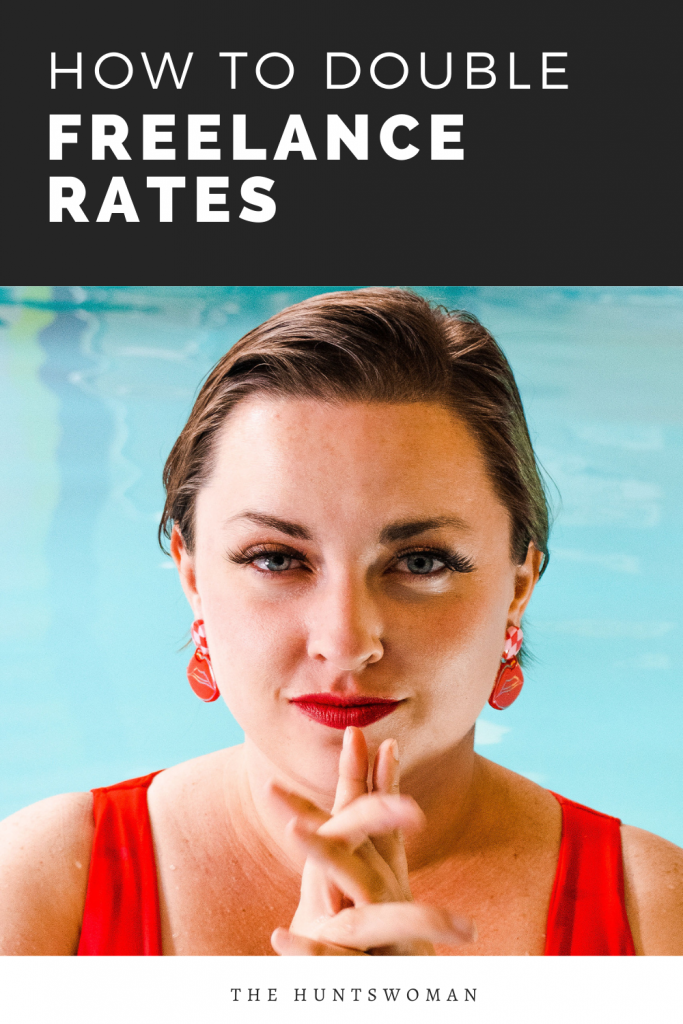
For Future Thought: Become a
“Consultant” – Not a “Freelancer”
Around year 5 (ish) of freelancing, I got tired of it all. I realized i wasn’t into doing the work, but I loved teaching people how to do it. I rebranded myself as a consultant, and now clients pay me to help them hire employees and freelancers! I consult and create strategy for clients, and I teach people how to do things. I also run classes and coach mastermind groups.
Eventually in your freelance career, you’ll move to consulting on how to do the work – instead of just doing it. The earlier you can do this the better, as the title “Consultant” tends to inspire a higher hourly wage.
Need help increasing your freelance hourly rate? Let’s work together! Click here to book a session.
Additional Helpful Posts
I love writing about freelancing and sharing career tips! Here are a few other posts that may interest you:
- How I Made $20,000 on UpWork
- How to Get Started as a Business Consultant
- $$ Checklist! Taking Your Business From Side Hustle to Full-Time
Want More Great Posts Like This?
If you want to stay up-to-date on posts from The Huntswoman, I recommend joining me on your favorite social media platform (Facebook, Instagram or Twitter).
More of an email kind of person? Join my business and career focused email list here, and/or my fashion-focused email list here!
